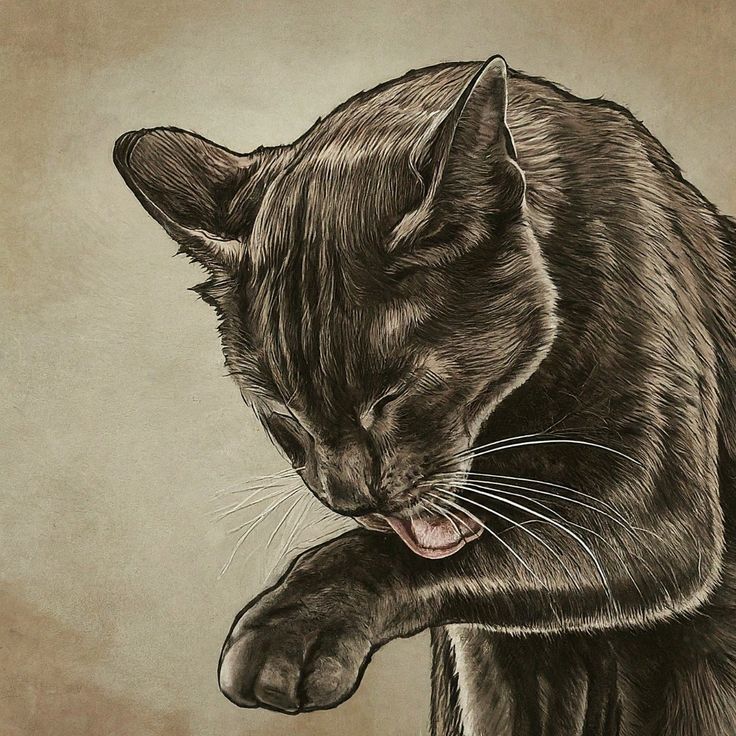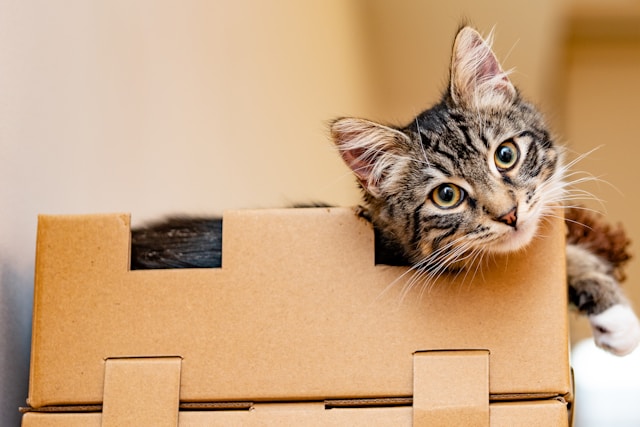
Cats can lick themselves excessively for medical and behavioral reasons. However, if your cat doesn’t have a medical reason to lick itself, such as a wound, it’s called psychogenic alopecia.
They will spend a lot of time licking and grooming themselves, causing wounds and hair loss. The main cause of excessive licking in cats is stress.
Treating the underlying cause of stress and adding relaxing activities and pheromones to your cat’s day can help your cat stop excessive licking.
What is Excessive Licking in Cats?
Excessive licking occurs when a cat spends an abnormally large amount of time licking itself obsessively. This can result in hair loss and skin wounds.
When a cat licks itself, endorphins, which are natural “feel-good” neurotransmitters produced by the brain, are released. These endorphins are the chemicals that provide the comforting sensation of self-care. Therefore, if your cat is stressed, it may resort to this comforting behavior.
Cat owners often report that they never see their cats engaged in intense licking sessions. This may be because the cat feels more comfortable when its human is in sight and doesn’t feel the need to soothe itself through licking.
When the owner is not present, the cat may start to feel uncomfortable and engage in excessive licking. If you witness your cat licking itself too much, avoid punishing it. This will only create more stress and may worsen the problem.
Why Do Cats Lick Excessively?
The predominant type of stress that usually causes psychogenic alopecia is likely chronic and consists of various combined stress factors, such as permanent changes in routine and environment.
This may include the absence of a family member due to death, divorce, longer work hours, vacations, or going off to college, as well as:
- The arrival of a new furry or human member in the family
- Moving to a new house or apartment
- Rearranging part or all of the furniture
- Moving the litter box to another location
- Lack of environmental enrichment for the cat
- Living in a chaotic household
Other cats may lick themselves excessively due to medical reasons. For example, if something is causing itching in your cat, it may lick itself excessively in an attempt to relieve the itch. Cats may have food allergies, fleas, or other environmental allergies.
Consider any recent dietary or environmental changes that may be causing this behavior. If you suspect your cat has allergies, consider scheduling an appointment with a specialized veterinary dermatologist, who can perform tests to determine if this is the cause.

Signs
If your cat is licking itself excessively, you may notice a line or patch of very short hair, similar to a close shave.
This can occur anywhere on your cat’s body, but it’s most common on a front paw, inner thigh, or belly. If the behavior is severe, the skin under the fur may become damaged, appearing red or sore.
How to Stop Excessive Licking
You’ll need a veterinarian to rule out any medical conditions and confirm the diagnosis of psychogenic alopecia. In the meantime, try to figure out why your cat is anxious. If you can identify the cause and eliminate it, the behavior may gradually disappear on its own.
You can also try some tips to help alleviate your cat’s anxiety and excessive licking behavior:
- If your cat is stressed by someone’s absence, have the person leave behind an unwashed sweater or blanket in a sealed ziplock bag. This may give your distressed kitty comfort with the smell of the absent person.
- Introduce a new cat gradually to reduce stress levels in both cats. Even confident cats can suffer from hidden stress that manifests as nervous licking.
- Play therapy is also a great way to relieve stress. It can help increase your cat’s self-confidence and help it associate a positive experience with the new home or a new pet or person.
- Interactive games are best, like chasing a fishing toy or laser games for cats.
- A pheromone product spray or plug-in, such as Feliway, may be helpful in relieving stress. Feliway and other synthetic pheromone products are similar to the odor naturally produced by cats. You can spray or rub it on objects, and it has a calming effect.
- During a veterinary visit, the doctor will rule out any medical reasons for your cat’s excessive licking. This may include allergies, flea infestation, skin mites, ringworm, bacterial or fungal infections, or metabolic conditions such as hyperthyroidism.
- Skin biopsies, laboratory tests, and a comprehensive physical examination may be helpful for the veterinarian to make the correct diagnosis. Any medical treatment will vary based on the veterinarian’s findings.
In most cases without a medical diagnosis, behaviors of excessive licking require therapy with anti-anxiety medications prescribed by a veterinarian to break the licking cycle.
Usually, the cat doesn’t need to take these medications for life, only for a period of time to help the animal deal with stress. Always follow your veterinarian’s instructions if your cat is taking any anti-anxiety medication. Any medication or training for this behavior requires time and patience to see effects.
Be aware that any treatment solutions for psychogenic alopecia may not be permanent. If your cat has a tendency to lick excessively, this behavior may recur at any time and may be an indicator that your cat is feeling stressed again.
If you suspect your pet is ill, immediately call your veterinarian. For health-related inquiries, always consult your veterinarian as they have examined your pet, know the pet’s health history, and can make the best recommendations for your pet.
